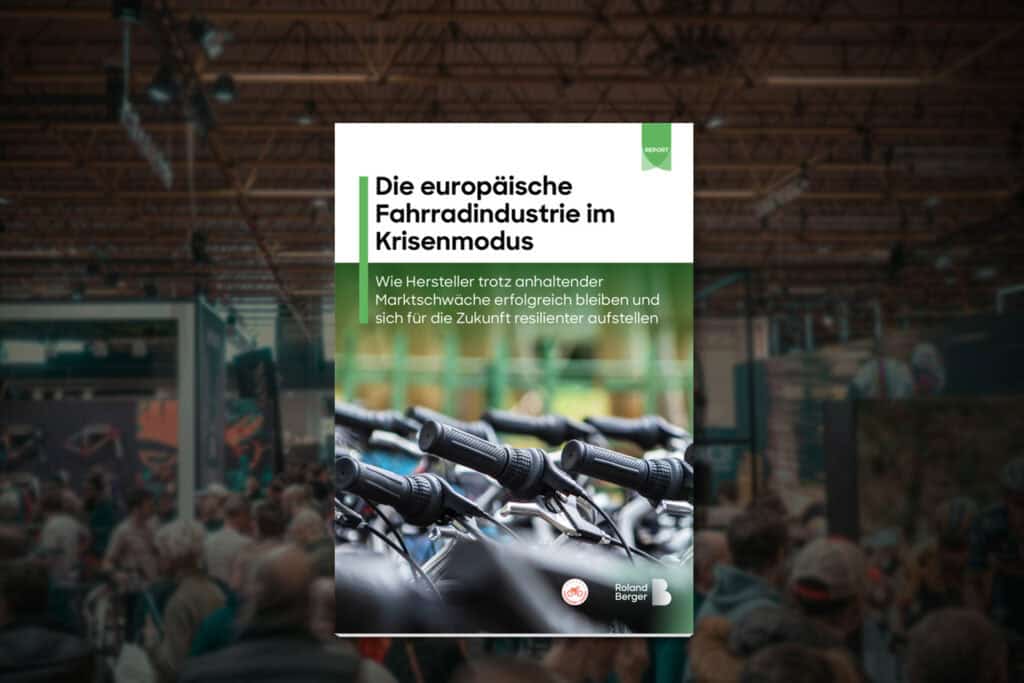In collaboration with the strategy consultancy Roland Berger IMPEX, German agency pressedienst-fahrrad has produced a report on the state of the European bicycle industry in 2024. The main takeaway: for bicycle manufacturers, it is essential these days to cut costs, professionalize processes, and rethink their strategic direction.

“The European bicycle industry is in crisis. After the boom years of 2021 and 2022, manufacturers are now facing underutilized production, rising costs, high inventory levels, and liquidity problems. The demand for bio-bikes (non-motorized bicycles) has especially seen a significant drop. In 2023, sales fell by 13 percent, according to ZIV data, and a market recovery is not on the horizon. Access to bank financing is also becoming increasingly difficult. Manufacturers must, therefore, take immediate action to secure their liquidity. Reducing inventory, enforcing strict cost discipline, and optimizing working capital are top priorities.”
This opening statement in the study published at the end of October by the strategy consultancy Roland Berger IMPEX and the German agency pressedienst-fahrrad highlights the challenges facing the bicycle industry. From mid-July to mid-August 2024, a total of 34 executives from bicycle manufacturers in Germany, Austria, and Switzerland were surveyed. Additionally, six managing directors and industry experts were interviewed. The result consists of the following five main takeaways.
1. The high-growth years have come to an end
Overfilled warehouses, rising costs, and a historically low consumer climate: few sectors have recently faced a downturn as severe as the bicycle industry. Survey respondents confirmed that this situation is heavily impacting their profits. So far, conditions remain challenging in 2024. In the first four months, manufacturers in Germany recorded a further 10 percent drop in sales compared to the same period last year. Even the leading trade fair, Eurobike, held in July, failed to bring a turnaround: both new releases and special deals at the fair generated little interest, and the expected spring demand largely failed to materialize. From discussions with industry leaders and relevant associations, the study’s authors conclude that the market is expected to stabilize by the 2026 season—albeit well below the boom years of 2021 and 2022.
2. Market recovery is taking longer than expected
This ties into the second key finding: the high inventory surpluses at manufacturers cannot be cleared within the next six months. Retailers will continue to place orders very cautiously, first reducing their own stock levels before making significant new purchases. The recovery phase is expected to start only with the 2026 season. Starkly, over 70 percent of survey participants anticipate further declines in revenue—more than half of them expect declines of over 10 percent. Access to liquidity, strict spending discipline, and optimization of working capital will, therefore, remain priority topics for the next two years, according to the study.
3. Action is needed
The study’s authors recommend four measures: securing liquidity, reducing costs, optimizing working capital, and improving processes. Interestingly, nearly three-quarters of the manufacturers surveyed by Roland Berger and pressedienst-fahrrad have already made significant capacity adjustments; more than half have instituted a hiring freeze to keep costs stable, and a third have cut marketing expenses substantially.
4. Medium-term sales may stagnate, though e-bikes will stay in demand
The good news: the industry’s future outlook is stable, and the overarching megatrend of carbon-neutral urban mobility remains intact. There is also growing political recognition that bicycles, especially in urban areas, are a key driver of the transportation transition. However, despite these guidelines, market recovery is primarily due to rising average prices per bicycle driven by the increasing popularity of e-bikes, rather than higher sales volumes. The study’s authors expect bicycle sales in Europe to stagnate in the coming years, although revenues will rise. The analysis also shows that e-bikes currently account for only around 30 percent of the European market, leaving further growth potential for manufacturers.
5. Success Factors for Resilient Business Models in the Bicycle Industry
Respondents also suggest that the bicycle industry needs more resilient business models. Manufacturers should optimize their product ranges, focus more on customer preferences, re-evaluate their strategies, strengthen their brands, and reduce dependencies.
The full report, including further insights and data, can be downloaded here (in German).
More news and updates from the Show Daily team
- Taipei Cycle d&i awards 2025: And The Award Goes To…
- Ananda: Tailored e-Drive Systems to Power Your Next Bike Project
- Europe Market Data: Large-scale Discounting Erodes Turnover
- New TA5 Standard: A Thru-Axle For the Masses
- Velo & SRAM: Uniting to Advance Sustainability


